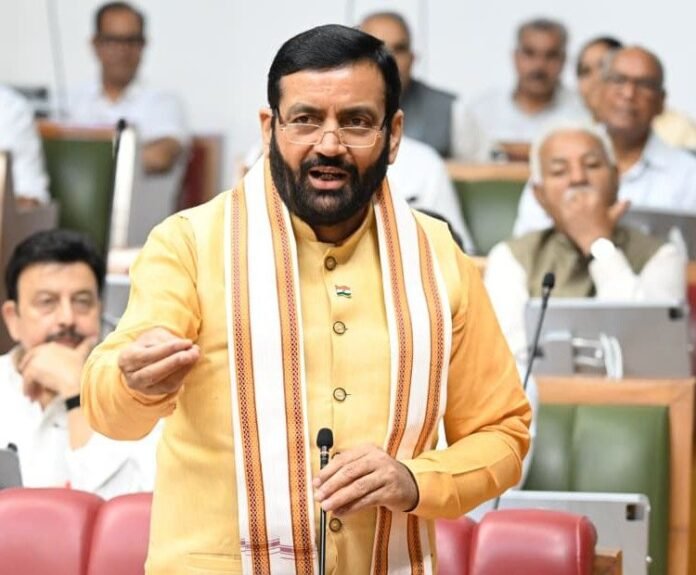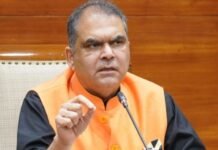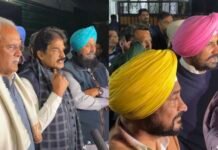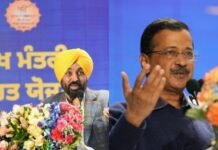Chandigarh, August 22 – The Haryana Legislative Assembly commenced its monsoon session on Thursday with solemn tributes to eminent personalities, freedom fighters, and brave soldiers who lost their lives in recent months. Chief Minister Nayab Singh Saini, Speaker Harvinder Kalyan, former Chief Minister Bhupinder Singh Hooda, and Deputy Leader of Opposition Aditya Devilal led the proceedings with heartfelt condolence motions. The session opened on a somber note as members of the Assembly, officials, mediapersons, and staff stood in silence for two minutes to honor the departed souls.
The condolence resolutions included tributes to several prominent figures, including former Governor of Jammu & Kashmir, Meghalaya, Goa, Odisha, and Bihar, Satya Pal Malik, former Haryana Assembly members Inder Singh Nain and Hari Ram Valmiki, and freedom fighter Mangal Singh from Rewari district. The Assembly extended deep sympathies to the bereaved families, underscoring the contribution of these figures to society, politics, and the nation’s history.
The House also expressed grief over the tragic terrorist attack in Pahalgam, Jammu and Kashmir, on April 22, 2025, in which 26 innocent civilians lost their lives. Members condemned the attack in the strongest terms, describing it as an assault on humanity and national integrity. The Assembly called for collective national resilience against terrorism, while offering condolences to the families affected.
Equally moving were tributes to those who perished in the Air India plane crash on June 12, 2025, which occurred on a flight from Ahmedabad to London. The accident claimed the lives of 260 passengers, including former Gujarat Chief Minister Vijay Rupani. Lawmakers mourned the heavy loss of life and remembered the late leader’s contribution to public service.
The Assembly also saluted the courage and sacrifice of 43 brave soldiers from Haryana who laid down their lives in the line of duty, defending the unity and sovereignty of the nation. The roll call of martyrs included high-ranking officers such as Colonel Shamsher Singh of Bhiwani’s Dhani Rahimpur, Squadron Leader Lokendra Singh Sindhu of Rohtak, Lieutenant Vinay Narwal of Karnal, and Flight Lieutenant Siddharth Yadav of Rewari, among others. Their sacrifices resonated deeply within the Assembly, where members acknowledged that Haryana continues to contribute significantly to the armed forces of India.
The detailed list of martyrs covered men from across districts including Charkhi Dadri, Mahendragarh, Jhajjar, Rewari, Sonipat, Kaithal, Sirsa, Yamunanagar, and Hisar. Each name reflected Haryana’s historical legacy as a land of valor, where military service and patriotic sacrifice remain interwoven into the cultural identity. The Assembly emphasized that the loss of these brave men is not only the state’s grief but also the nation’s collective mourning.
Apart from national figures and security personnel, the condolence motions also extended to personal bereavements of political families. Tributes were paid to relatives of prominent politicians including Assembly Speaker Harvinder Kalyan’s aunt Gurbachni Devi, MP Kiran Choudhry’s uncle-in-law Hari Singh, former CM Bhupinder Singh Hooda’s relatives, Aditya Surjewala’s family members, and others. The Assembly recognized that behind every public servant lies a support system of family, and such losses are equally significant to the functioning of society.
The proceedings also highlighted the importance of remembering those who contributed to public life, freedom struggles, and regional development. Lawmakers agreed that such moments of collective remembrance strengthen democratic institutions by acknowledging the sacrifices made by leaders and citizens alike.
Following the condolence session, the House moved on to legislative business. On the opening day, three significant bills were introduced:
- Haryana Legislative Assembly (Members’ Salaries, Allowances, and Pension) Amendment Bill, 2025
- Haryana Backward Classes Commission (Amendment) Bill, 2025
- Haryana Municipal Areas Special Provisions (Amendment) Bill, 2025
These bills reflect both administrative reforms and governance priorities. The first bill addresses members’ entitlements, potentially streamlining expenditures and accountability in line with changing governance standards. The second focuses on strengthening the Backward Classes Commission, signaling the government’s attention to issues of representation and equity. The third bill aims to tackle infrastructural and civic challenges in municipal peripheries, ensuring that urban growth is supported by adequate facilities and services.
For observers in India and abroad, the monsoon session of the Haryana Assembly not only showcased legislative activity but also underscored the cultural and political ethos of India’s federal democracy. Condolence motions in Indian legislatures are not merely formalities; they reflect the social fabric where leaders, freedom fighters, and soldiers are collectively remembered as part of national identity.
From an international perspective, Haryana’s emphasis on honoring martyrs highlights the state’s disproportionate contribution to India’s defense forces. Though smaller in geography and population, Haryana continues to supply a large number of officers and soldiers to the Army, Air Force, and paramilitary services. This cultural phenomenon dates back centuries, from the times of Mahabharata to modern conflicts, and reinforces the state’s image as a land of warriors.
Similarly, the Assembly’s tribute to those who died in the Air India crash has global resonance. Air disasters are not only national tragedies but also global concerns, reminding the world of the importance of aviation safety, international cooperation, and emergency response mechanisms. Mentioning a former Chief Minister among the deceased elevated the crash into both a political and humanitarian tragedy.
The acknowledgment of Satya Pal Malik, a former Governor in multiple states, also connects the proceedings to broader national debates. Malik had been a prominent political figure who held gubernatorial posts in Jammu & Kashmir during critical times, including the abrogation of Article 370. Remembering him in the Haryana Assembly highlighted the interconnectedness of Indian federal units, where the passing of a leader resonates across state boundaries.
By concluding the first day with a mix of solemnity and legislative intent, the Haryana Assembly set the tone for the remainder of the monsoon session. While grief was a dominant theme, the introduction of bills indicated that governance must continue alongside remembrance. The balance between respecting the past and legislating for the future reflected the dynamic nature of parliamentary democracy in India.
For Indian readers, the proceedings reflect familiar rituals of homage and governance. For global audiences, they offer a glimpse into how Indian states function within the federal system, blending local, national, and international concerns into the legislative process. The session illustrated India’s resilience: mourning losses while continuing the work of democracy.
Meta Description (SEO-optimized): Haryana Assembly monsoon session opens with tributes to leaders, martyrs, and victims of recent tragedies, including 43 soldiers, Satya Pal Malik, and Air India crash victims. CM Nayab Singh Saini, Speaker Harvinder Kalyan, and opposition leaders lead condolence motions. Three key bills introduced on governance, backward classes, and urban infrastructure.
📌 Source: Haryana Vidhan Sabha proceedings, Government of Haryana release.
📌 Note: This is a web-generated news report prepared for digital publication.




